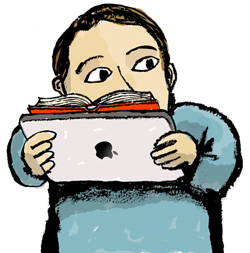I was impressed when I read in one of
Steven Pinker's books that identical twins separated at birth tended to vote along the same party lines. I thought of the idea again when I came across
The Psychology of Conservatism Academic Press, by G.D. Wilson.
According to wikipedia "His 1973 theory that a heritable trait reflecting fear of uncertainty underlies social attitudes in all fields has much empirical support." According to Wilson
the fear of uncertainty leads to conservative beliefs. (Do not read "fear" with bias though, I think a better choice of word would be "dislike".)
What I find compelling is the idea that maybe our genes lead us to have certain reactions based on certain emotions. Obviously there's no GOP or Democrat gene, but I find the idea that some people are more likely to react with a yearning for traditional values (maybe a certain nostalgia based sense of security) when exposed to uncertainty and fear does work for me. In other words the idea is that when presented with a certain stimulus some people are genetically predisposed to have a certain emotional response and this response tends to fall along certain political party values.
This then makes it a strange thing to debate political parties. Sure we can debate specific issues and possibly come to consensus across party lines, but the overall party is emotionally based and that's not something you can argue someone into changing themselves on (most of the time). I should disclose that I've always been skeptical against having a debate over whether one party is better than another, so I'm predisposed towards believing in the science that agrees with me. :)
This then led me to wondering if the political party in power matters for the overall economy. If in truth the economy has very little to do with politics or government (with a few rare exceptions). Of course we should vote for the politician that upholds the values and platform that we think is right, but I'm not sure we should vote based on the overall economy although we probably always will since it may be an emotional reaction that reason can't best.
It also had me thinking about the graph of the US GDP versus which party is in power. I can't find it now, but it showed that for the past 100 years or so the economy improved with Democrats in power and went down with Republicans in power. At first I thought this might be meaningful of who you should vote for, but now I am not so sure. If times of uncertainty and fear bring out conservative values then we'll have Republicans in power then. Times of fear and uncertainty are probably bad economic times (certainly at least with consumer confidence) so we have low GDP. Instead of the party being causal, maybe its just reflective. This would certainly be true if in general the government really has only a minor impact on the overall economy.
All of the above is just musing though and nothing I'm really sure about except that I do believe our genes can lead us to have certain reactions based on certain emotions and this has predictive implication.
